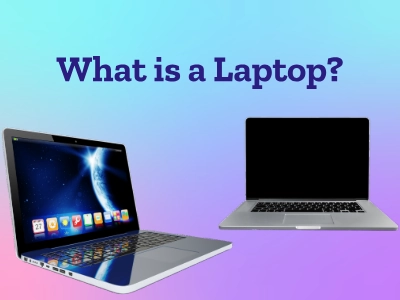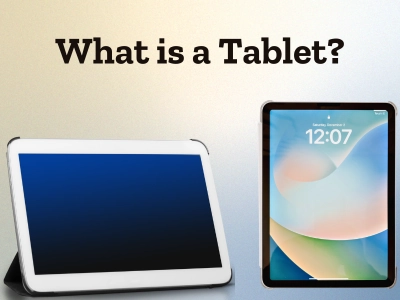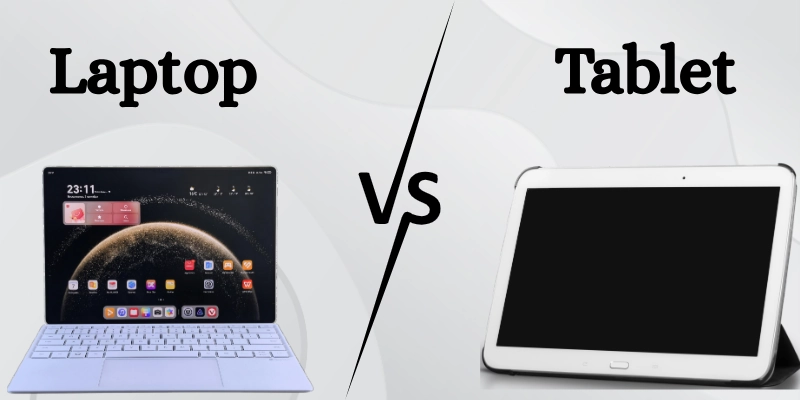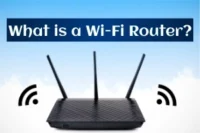Laptop vs Tablet: Which Device Fits Your Lifestyle Best
Published: 22 Sep 2025
We’ve all been there, standing in a store or scrolling online, wondering, “Should I get a laptop or a tablet?” It feels tricky because both seem useful, but in different ways.
A laptop is like your portable computer buddy, perfect for typing, school projects, or office work. A tablet is more like a handy, lightweight friend, great for reading, watching shows, or quick browsing.
In this article, we’ll look at laptop vs tablet.
What is a Laptop?
A laptop is a portable computer that comes with a built-in screen, keyboard, and operating system. You can carry it around and use it almost anywhere, which makes it one of the most popular devices in the world.

Here are some features of a laptop.
- Laptops are powerful and flexible devices.
- They usually have a large storage space.
- They come with strong processors.
- They can run many programs at the same time.
- Perfect for both work and personal use.
What is a Tablet?
A tablet is a portable device with a touchscreen. You can think of it as a mix between a smartphone and a laptop. It’s bigger than a phone but smaller and lighter than most laptops, making it easy to carry around.

Here are some features of a tablet.
- Lightweight and slim design.
- Runs on mobile operating systems like Android or iOS.
- Supports stylus or touch pen for drawing and note-taking.
- Easy to use with just a touch of your fingers.
Laptop vs Tablet
When it comes to choosing between a laptop and a tablet, it helps to look at their main differences. This laptop vs tablet comparison will show you where each device stands out.

Here are some differences between a laptop and a tablet.
Size and Portability:
Here is the difference in size and portability between a laptop and a tablet.
- Laptops: Usually heavier and less portable. Best for desks, offices, or classrooms.
- Tablets: Slim, lightweight, and super easy to carry anywhere.
Performance:
Here is the difference in performance between a laptop and a tablet.
- Laptops: Come with powerful processors, handle multitasking, and run professional software.
- Tablets: More suitable for light tasks like browsing, streaming, and using basic apps.
Storage Capacity:
Here is the difference in storage capacity between a laptop and a tablet.
- Laptops: Offer large storage options with HDDs or SSDs, great for big files.
- Tablets: Limited storage space, often relying on cloud storage.
Input Method:
Here is the difference in input method between a laptop and a tablet.
- Laptops: Use a physical keyboard and mouse/trackpad for typing and control.
- Tablets: Work with a touchscreen and often support a stylus for notes or drawing.
Battery Life:
Here is the difference in battery life between a laptop and a tablet.
- Laptops: Average battery life of 5–10 hours, depending on usage.
- Tablets: Usually last longer on a single charge.
Price Range:
Here is the difference in price range between a laptop and a tablet.
- Laptops: Available in a wide range, from budget to very expensive models.
- Tablets: Entry-level options are cheaper, though high-end tablets can also cost a lot.
Laptop vs Tablet: Advantages and Disadvantages
When comparing a laptop and a tablet, both come with their own advantages and disadvantages. Knowing these pros and cons will help you choose the device that fits your needs best.
| Feature | Laptop – Advantages | Laptop – Disadvantages | Tablet – Advantages | Tablet – Disadvantages |
| Performance | Powerful processors run heavy software easily | Heavier software may cause heating | Good for basic tasks and apps | Not suitable for heavy tasks (e.g., video editing, programming) |
| Storage | Large storage (HDD/SSD) for files and apps | SSD models can be expensive | Cloud storage is friendly, and some expandable storage | Limited in-built storage compared to laptops |
| Portability | Portable compared to a desktop | Heavier and bulkier than tablets | Extremely lightweight and easy to carry | Smaller screens are not great for long work sessions |
| Battery Life | 5–10 hours average | Shorter battery life compared to tablets | Longer battery life (10–15 hours average) | Battery performance decreases with heavy use |
| Input Method | Physical keyboard & trackpad, good for typing | Requires desk space for comfort | Touchscreen, stylus support, very user-friendly | Typing without a keyboard is uncomfortable for long writing |
| Price | Wide range, professional laptops cost more | High-end laptops are very expensive | Entry-level tablets are affordable | High-end tablets with accessories can also be costly |
| Use Case | Best for students, professionals, and gamers | Less casual, not ideal for quick browsing | Best for entertainment, reading, traveling | Not suitable as a complete laptop replacement |
Which One is Best for You?
Choosing between a laptop and a tablet depends on who you are and how you plan to use the device. Let’s break it down to see what fits different needs.
For Students:
When it comes to laptops vs tablets for students, both can be useful.
- Laptops: Great for writing assignments, working on projects, doing research, and even coding.
- Tablets: Handy for note-taking, reading e-books, and casual learning on the go.
For Professionals:
Looking at laptop vs tablet for work, here’s the difference.
- Laptops: Perfect for office tasks, designing, programming, and handling professional software.
- Tablets: Useful for meetings, giving presentations, and doing quick tasks.
For Entertainment:
Here’s how laptops and tablets work for fun.
- Laptops: Good for watching movies, playing games, and multitasking between apps.
- Tablets: Better for streaming on the go, reading books, and casual gaming.
For Travelers:
When it comes to laptop vs tablet for travel, weight and purpose matter.
- Laptops: Can serve as a portable office setup, helpful for work on the move.
- Tablets: Lightweight and easy to carry, perfect for entertainment during trips
Conclusion
When comparing laptops vs tablets, the main differences are in portability, performance, storage, and price. Laptops are stronger and better for heavy work like projects, office tasks, or coding. Tablets are lighter, easier to carry, and great for reading, streaming, or quick use.
Both laptops and tablets are useful. The right choice depends on your needs; students, professionals, or travelers can pick based on their daily tasks. Think about how you will use the device, and you’ll know which one fits your life best.
Choose the device that fits your needs, a laptop or a tablet; the right one makes life easier.
FAQs
Got more questions about laptops and tablets? Check out these FAQs for quick answers.
A laptop is better for heavy work like projects, coding, or office tasks. A tablet is better for light use like reading, streaming, or quick browsing.
Yes, a tablet is good for note-taking, reading, and online classes. But for projects, assignments, or coding, a laptop works better.
Most tablets have limited storage space. You may need cloud storage or external drives for extra files.
A tablet is better for traveling because it’s light and easy to carry. A laptop is better if you need a full office setup on the go.
Yes, you can connect a keyboard to most tablets. Many also support wireless keyboards and stylus pens.
A tablet usually lasts longer on battery because it uses less power. Laptops drain faster, especially with heavy tasks.
Yes, laptops with good graphics and processors are better for gaming. Tablets can handle only casual or mobile games.

- Be Respectful
- Stay Relevant
- Stay Positive
- True Feedback
- Encourage Discussion
- Avoid Spamming
- No Fake News
- Don't Copy-Paste
- No Personal Attacks

- Be Respectful
- Stay Relevant
- Stay Positive
- True Feedback
- Encourage Discussion
- Avoid Spamming
- No Fake News
- Don't Copy-Paste
- No Personal Attacks





